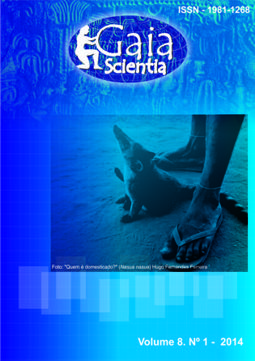The influence of climate on the spread of dengue in the Areia city, Paraíba
Abstract
At this study, we aimed to analyze the temporal and seasonal occurrence of dengue cases from 2007 to 2012, as well as establishing a relation of the climatic factors such as temperature, rainfall and relative humidity can influence the increase or decrease in these cases. This study used weather data from the cases of the condition of the City of Areia, Paraiba, whose climate is classified as hot and humid Tropical. The results show that there is a high incidence of cases in the second half than in the first half was favored by the temperature which reaches its climax in the early months of the year and the second half where there is a drop in temperature and the cases also decline, precipitation already also acted as a limiting factor in the proliferation of dengue since in periods of less rainfall there was a decrease of cases as well as the very rainy periods, because of the scarcity or excess water are not ideal for the proliferation of Aedes aegypti, the humidity was a factor that had a significant relationship as well in cases of the disease being one of the factors responsible for high rates of cases of the city of Areia, had an average relative humidity of the air between 83% and 85% in the years 2007, 2008 and 2011 that were the years with more cases of dengue, which was also observed in summer and autumn climatic conditions favor the spread of dengue.Downloads
Download data is not yet available.
Downloads
How to Cite
BARACHO, R. C. M.; ISMAEL FILHO, A.; GONÇALVES, A.; NUNES, S. de T. S.; BORGES, P. de F. The influence of climate on the spread of dengue in the Areia city, Paraíba. Gaia Scientia, [S. l.], v. 8, n. 1, 2014. Disponível em: https://periodicos.ufpb.br/ojs/index.php/gaia/article/view/18071. Acesso em: 21 nov. 2024.
Issue
Section
Ciências Ambientais










